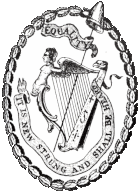United Irish Society
|
Society of United Irishmen
|
|
|---|---|
 |
|
| Historic Leader | Theobald Wolfe Tone |
| Headquarters | Dublin, Ireland |
| Newspaper | Northern Star |
| Ideology |
Irish republicanism Classical liberalism |
| Party flag | |
 |
|
The Society of United Irishmen was founded as a liberal political organisation in 18th-century Ireland that initially sought Parliamentary reform. However, it evolved into a revolutionary republican organisation, inspired by the American Revolution and allied with Revolutionary France. It launched the Irish Rebellion of 1798 with the objective of ending British monarchical rule over Ireland and founding a sovereign, independent Irish republic.
During the 1780s, a few liberal members of the ruling Protestant Ascendancy, organised as the Irish Patriot Party led by Henry Grattan, campaigned for: reform of the Irish parliament; a lessening of British interference in Ireland's affairs; and expanding the rights and voting franchise for Catholics and Presbyterians. Backing them up was the Irish Volunteers movement, which had widespread Protestant support. Whilst they had limited success such as the establishment of Grattan's Parliament and the repeal of some of the discriminatory Penal Laws, they fell short of many of their aims. When the parliamentary reform movement collapsed in 1784, it left radicals without a political cause.
By the mid-1780s, radicalism in Ireland was taking a new, bolder form, typified by the letters penned by William Drennan which were published in the Belfast Newsletter and in pamphlets. In them he hit out at leaders of the Volunteers such as Grattan and Charlemont for their conservatism and restraint, and at the political establishment for preventing the reform of the Irish parliament. Most notably was his appeal for all Anglicans, Dissenters, and Roman Catholics to unite together as one indifferent association, however he accepted that this would only appeal to the minority within each denomination. Inspiring and increasing the radicalisation of Irish reformists was the French Revolution which had started in 1789, and had so far remained largely bloodless, with the French king forced to concede effective power to a National Assembly.
...
Wikipedia
